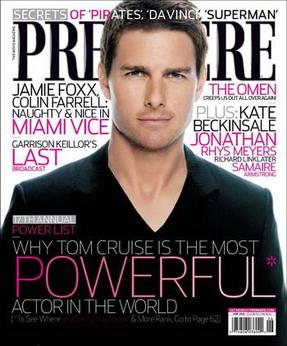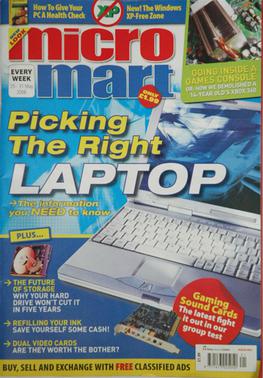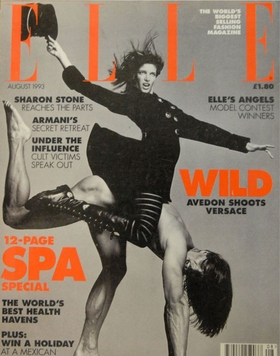Related Research Articles

Grupo TelevisaS.A.B., simply known as Televisa, is a Mexican multimedia mass media and entertainment company. A major Latin American mass media corporation, it often presents itself as the largest producer of Spanish-language content.

Total Film is a British film magazine published 13 times a year by Future Publishing. The magazine was launched in 1997 and offers a cinema, DVD and Blu-ray news, reviews, and features. Total Film is available both in print and interactive iPad editions.
Reforma is a Mexican newspaper based in Mexico City. It has 276,700 readers in Mexico City. The paper shares content with other papers in its parent newsgroup Grupo Reforma. Reforma is named after the Mexico City avenue of the same name, Paseo de la Reforma, which is in turn named after "La Reforma", a series of liberal reforms undertaken by the country in the mid-19th century.

Première is a French film magazine based in Paris and published by Hachette Filipacchi since 1976. Editions are, or have been, published in other markets.

Astronomy is a monthly American magazine about astronomy. Targeting amateur astronomers, it contains columns on sky viewing, reader-submitted astrophotographs, and articles on astronomy and astrophysics for general readers.

Woman's Day is an American women's monthly magazine that covers such topics as homemaking, food, nutrition, physical fitness, physical attractiveness, and fashion. The print edition is one of the Seven Sisters magazines. The magazine was first published in 1931 by The Great Atlantic & Pacific Tea Company; the current publisher is Hearst Corporation.

Micro Mart was a weekly computer magazine published in the United Kingdom by Dennis Publishing Ltd. As of 2015, it had a circulation of 5,422. In a letter to subscribers in December 2016 it was announced that the magazine would cease publication with issue No 1445 : "After 30 amazing years of telling it like it is, Micro Mart magazine is logging off."

Noticieros Televisa, also branded as N+ since 2022 following the split of Grupo Televisa with the formation of TelevisaUnivision, is the news service of Tritón Communicaciones, which produces national and local television news bulletins for TelevisaUnivision's Mexican networks.
Grupo Reforma is the largest printed media company in Mexico and Latin America. It publishes ten daily newspapers in five cities, including the leading newspapers in Mexico's three largest cities: Reforma in Mexico City, El Norte in Monterrey and Mural in Guadalajara. It also publishes the daily Metro in Mexico City, Monterrey, Guadalajara, Puebla and Toluca, and the afternoon tabloid El Sol in Monterrey. The average daily circulation of all these papers is 1.4 million copies.

esmas.com was the portal of Televisa, the largest Mexican television network and the world's largest producer of Spanish language media. The website was registered under Comercio Mas and was launched by Grupo Televisa in 2000. Previously, the official website of Televisa was televisa.com. As of 2022, the website redirects to Televisa's news website, Noticieros Televisa.

Promotora de Informaciones, S.A. (PRISA) is a Spanish media conglomerate headquartered in Madrid, Spain. It is one of the largest media companies in Spain and all of Latin America, producing a wide variety of educational, cultural and informative content. PRISA owns a portfolio of newspapers, magazines, radio stations, and television networks. The majority subsidiaries and brands of the company are El País, Cadena SER, and Santillana.
Practical Performance Car Magazine ("PPC") was a British car magazine published monthly by Blockhead Media. The magazine used the strap-lines "Performance Tuning for Grown Ups" and "Building, tuning & buying real-world performance cars".

Madame Figaro is a French magazine supplement to the Saturday edition of the daily newspaper Le Figaro, focusing on and catering to women.
Mundo Estranho, first issued November 2001, was a monthly diversities and fun facts magazine, very popular among Brazilian teenagers and one of the country's most popular magazine of its type. It started as a section in the more popular Superinteressante magazine, but was already a separate paperback a few months after its first issue, later converted to a full-fledged separate magazine.
Chilango is a monthly entertainment Mexican magazine. It was established by Grupo Expansión in November 2003 in Mexico City. It has won the National Journalism Prize of Mexico twice.
Jorge Alor is the founding editor of Sputnik, Atomix, and Sonika. He is also the founder of Mexican annual music festival, Manifest.

Audio magazine was a periodical published from 1947 to 2000, and was America's longest-running audio magazine. Audio published reviews of audio products and audio technology as well as informational articles on topics such as acoustics, psychoacoustics and the art of listening. Audio claimed to be the successor of Radio magazine which was established in 1917.

Elle is a worldwide women's magazine of French origin that offers a mix of fashion and beauty content, together with culture, society and lifestyle. The title means "she" or "her" in French. Published by the Paris-based Lagardère Group, Elle is considered one of the world's leading women magazine, with 45 editions around the world and 46 local websites. It now counts 20 million readers, a circulation of 4 millions and 100 million unique visitors per month. It was founded in Paris in 1945 by Hélène Gordon-Lazareff and her husband, the writer Pierre Lazareff. The magazine's readership has continuously grown since its founding, increasing to 800,000 across France by the 1960s. Elle editions have since multiplied, creating a global network of publications and readers. Elle's international expansion begun with the launches of ELLE UK and ELLE USA, in 1985.

FAHRENHEITº is a bimonthly magazine of contemporary art and lifestyle that addresses the theme from different disciplines of art, criticism and theory. It was founded in 2003 in Mexico City by Rubén José Marshall Tikalova. Its website was launched in 2009; in this site there can be found news from contemporary art and culture, in Spanish, English and French. The magazine is intended for a range of audiences. Both media and readers have found in FAHRENHEITº a means of staying in contact with the art world. The magazine has received coverage since 2003 in the press, magazines and catalogues, and in a research thesis.
Unomásuno is a Mexican daily tabloid newspaper circulated in Mexico City. Formed in 1977 by former employees of Mexico City's daily newspaper Excélsior, it became one of the leading leftist newspapers in Mexico during the late 1970s and early 1980s. The newspaper covered investigative topics that were often avoided by the rest of the Mexican press at the time, and it was a harsh critic of the Mexican government. By the mid-1980s, disagreements over the newspaper's management style led to internal divisions. Those who disagreed with Unomásuno and its future initiatives left in 1984 and formed La Jornada, another leftist daily in Mexico City.